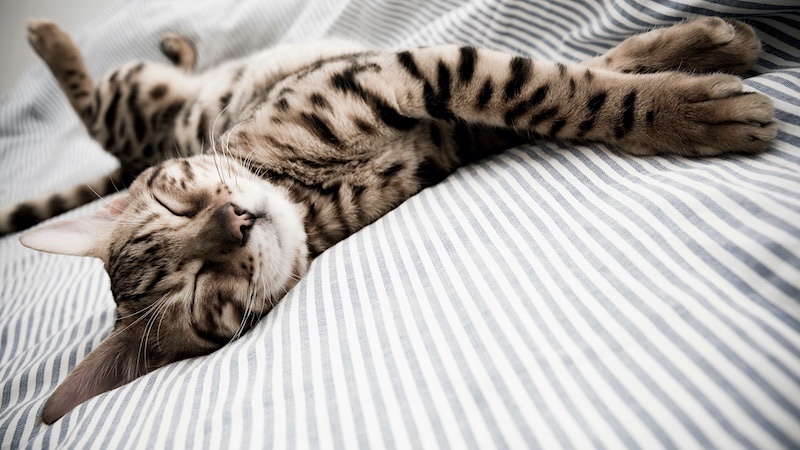Bengal cats are renowned for their striking appearance, resembling their wild ancestors while maintaining the size and personality of a domestic feline. This energetic and affectionate breed has captured the hearts of many cat owners, but prospective Bengal cat caregivers might be curious about their sleep patterns and habits.
How much do Bengal cats sleep? On average, these stunning pets sleep around 12-14 hours per day which is down slightly on the average domestic cat, though the actual duration may slightly vary depending on factors such as the cat’s age and individual disposition.
Understanding a Bengal cat’s sleep requirements can aid owners in providing proper care and maintaining a harmonious household. A well-rested Bengal cat will have enough energy to engage in playtime and bond with their human family, ensuring a happy and fulfilling relationship for both parties.
Understanding Bengal Cats Sleep Patterns

Cats Sleep
Cats, in general, are known for their lengthy sleep patterns. Domestic cats, for example, typically sleep for around 12 to 16 hours a day. Their sleep patterns are essential to their overall health and well-being.
Bengal Cats Sleep
Bengal cats demonstrate similar sleep patterns to other cats, averaging between 12 and 14 hours of sleep per day. They are crepuscular animals, meaning they are most active during dawn and dusk. Bengal cats may show some variation in their sleep habits, depending on age, health, and activity level.
Deep Sleep
During deep sleep, cats experience muscle relaxation and reduced brain activity. This phase of sleep is crucial for repairing and restoring their bodies. In the case of Bengal cats, deep sleep typically accounts for a significant portion of their total daily sleep hours.
REM Sleep
All cats, including Bengal cats, experience rapid eye movement (REM) sleep. This stage of sleep is when cats are most likely to dream. It is an essential part of their sleep cycle, playing a crucial role in their mental and emotional health.
Factors Affecting Bengal Cats Sleep

Age
As with all cats, a Bengal cat’s age can significantly impact its sleep patterns. Kittens and older cats require more sleep, averaging around 16 to 20 hours per day.
Energy Levels
Bengal cats are known for their high energy, and this trait could lead to a decrease in daily sleep hours. These energetic felines typically require 12 to 14 hours of sleep to replenish their energy for playtime and exploration.
Health
A healthy Bengal cat will maintain a normal sleep schedule, but certain illnesses or pain can disrupt their rest. Cats suffering from hyperthyroidism, for example, may experience an increase in energy levels, leading to sleeplessness.
Stimulation Needs
Stimulation is important for their overall well-being, which can affect their sleep patterns. Providing mental and physical stimulation through toys, interactive play, and a stimulating environment can help ensure a healthy sleeping routine for your Bengal cat.
How to Keep Your Bengal Cat Comfortable While Sleeping
Place and Positioning
Bengal cats enjoy sleeping in raised, safe spaces. High places can make them feel secure. A cozy spot next to you on the bed can provide additional comfort while also allowing them to remain close and bond.
Ensure that their chosen sleeping area is large enough for them to stretch out fully, as they may prefer to sleep on their side or back with their legs extended.
Smart Choices of Beds and Resting Spots
To maximize comfort for your Bengal cat, consider investing in a hooded cat bed, which provides a more enclosed and secure environment. Additionally, positioning the bed near a window can allow them to keep an eye on their surroundings or bask in the sun throughout the day.
For those cats that prefer to sleep perched up high, cat trees with built-in beds or hammocks like the one below can offer the perfect solution. Lastly, when selecting a cat bed or resting spot, prioritize soft materials that will cushion your cat’s body and offer proper support during the duration of their 12-14 hour slumber.
If you want a tall cat tree that fits medium to large cats with various features and sturdy construction, this is the cat tree is for you.
Ideal for cats who like to sleep in high spots as it features two sleeping boxes and a hammock for those daytime naps.
- 81.1" tall with 5 levels for endless climbing
- A total of 13 scratching posts
- Includes spare hanging balls which is a nice touch
- All-in-one playground that can handle multiple cats
- Durable and safe structure with anti-tip kit
- Modern dark Grey color
- Easy to clean
- Included step by step instructions and all parts are numbered for easy assembly
Sleep Behavior in Bengal Cats
Cat Napping
Bengal cats, like other domestic cats, sleep for an average of 12 to 14 hours a day. Due to their active nature, they may sleep less than other cat breeds, but still indulge in cat naps to conserve energy for playtime and exploration.
Alertness While Sleeping
Even when snoozing, Bengal cats maintain a certain level of alertness, as their ancestors were prey animals. This wakefulness allows them to react quickly to potential threats or sudden movements, giving them an advantage in case they need to either escape or pounce on prey.
Interpreting Sleep Positions and Postures
Bengal cats can display various sleep positions that may indicate how at ease they feel in their environment. A Bengal cat lying on its back with an exposed abdomen is a sign of trust and confidence in its surroundings, as the abdomen houses vital organs and muscles.
Ensuring your Bengal cat is comfortable in its environment is crucial for promoting healthy sleep patterns. Owners should provide warm and cozy spots for their pets to sleep, helping them feel safe and secure while napping or resting.
Bengal Cat History and Trivia
Origins of the Breed
Bengal cats were first developed in the United States by Dr. Willard Centerwall who wanted to create a breed that was immune to the feline leukemia virus. In the 1970s, the breeding program was carried on by Jean Sugden Mill, who aimed to create a domestic cat with a wild, exotic appearance.
Those exotic looks together with its potential for being hypoallergenic has made it a highly desirable pet, hence the reason Bengal cats are so expensive.
Evolutionary Explanations for Bengal Cat Sleeping Habits
Sleeping Patterns in Wild Ancestors

Bengal cats’ wild ancestors, the Asian leopard cat, exhibit crepuscular behavior, being most active at dawn and dusk. This adaptation allows them to hunt for prey when their senses are sharpest, avoiding the intense heat of the day.
The Asian leopard cat’s nocturnal nature has also influenced Bengal cat sleeping habits, as they too tend to be active at night. Hence, Bengal cats sleep for long periods during the day in order to conserve energy for their nighttime activities.
Sleep as an Energy Conservation Strategy
Sleeping for extended periods is an evolutionary strategy employed by Bengal cats to conserve energy. By resting 12 to 14 hours a day, Bengal cats are able to maintain the energy levels necessary for their active lifestyles, both during their crepuscular and nocturnal activities.
Furthermore, their adaptive paws enable Bengal cats to efficiently stalk their prey in the wild, ensuring they expend minimal energy during hunting. This energy-conserving behavior has been passed down through generations, playing an essential role in the Bengal cat’s overall health and survival.
Frequently Asked Questions
Bengal Cats Sleeping Habits
Bengal cats are known to sleep a lot, averaging around 12 to 16 hours per day. They are most active during dawn and dusk, which are their natural crepuscular rhythms.
Do They Sleep with Humans?
Many Bengal cats enjoy sleeping with their owners at night, with around 74% of owners reporting that their Bengals sleep with them. However, Bengals can also be noisy at night and may disturb some owners’ sleep. Also, if you have allergies it s best to keep a cat off your bed.
Bengal Cats’ Sleep Schedules
Cats are crepuscular animals, meaning they are most active during the early morning and early evening. During the day and night, they will sleep for extended periods to conserve energy.
Ideal Sleep Environment for Bengals
A comfortable and quiet space, such as a cozy cat bed or a secluded area of the house, is essential for a Bengal cat’s rest. Providing them with a proper sleeping environment will help ensure they get the rest they need.
Are Bengals Light or Heavy Sleepers?
Cats, including Bengals, have various sleep stages, with some being lighter, like humans. However, the specific sleep depth of a Bengal cat may vary depending on the individual and its environment.
Sleep Issues in Bengal Cats
Bengal cats might experience sleep issues such as sleep interruptions or difficulty settling down for rest. If you notice your Bengal cat exhibiting signs of sleep problems, consult with your veterinarian for guidance and potential treatment options.







